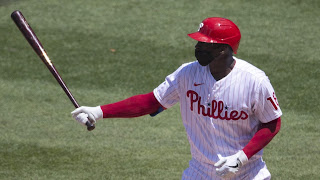The true creed of this nation has always been: value the
dollar over the individual. Major League Baseball followed that creed to the
letter in 2020.
As we all remember, professional sports were forced to shut
down in March due to the coronavirus pandemic. The virus raged on until
mid-May, when the number of new cases began to drop. That’s when the haggling
began.
MLB put together a plan for a shortened season, but its
salary proposal to the players union was immediately rejected. The two sides
argued back and forth for weeks until MLB finally agreed to the union’s demand
that the players earn a prorated salary based on the length of the shortened
season. Sixty regular season games were scheduled, so all players (except those
lucky few who were owed a club option in their contract for 2020) would make
roughly 37 percent of their 2020 salaries. However, the players actually made
much less than 37 percent, because the $170 million advance they collectively received
from MLB back in April could only be kept if the 2020 season was cancelled
completely.
I know you’re probably thinking that anyone getting paid in
the seven-to-eight-figure range has no right to complain, but keep in mind that
a large chunk of players aren’t actually millionaires (i.e. - bench players,
middle relievers and virtually everyone who’s been in the league less than
three years). I admit that the squabbling between the league and players came
off as petty, but there’s an overlying reality that leaves me emphatically
siding against the league and owners.
I personally felt like MLB should have canceled the season
outright back in March. Unlike the NBA and NHL, baseball did not have the
luxury of placing all 30 teams in a single quarantined area to play a shortened
season, and anyone who paid even the slightest attention to the CDC and NIAID
Director Dr. Fauci knew that the reprieve from the pandemic was only temporary.
Predictably, by the time the season began on July 24, the
second wave of the virus swept across the nation at double the intensity of the
first. Within the first few weeks, the Miami Marlins and St. Louis Cardinals
both suffered COVID-19 outbreaks that each infected more than a dozen players
and staff. Each team was forced to take a week off and play out their 60-game
schedules with a grueling stretch of doubleheaders. This was exactly why the
season was postponed in the first place.
A few players decided on their own to sit out the entire
season due to the pandemic, and I salute them. Given how virulent this virus is,
if you’re not doing everything you can to prevent exposure, both for your and
everyone around you, you’re making it worse. The one thing MLB got right was
not allowing any fans in the stands during the regular season, but I personally
feel that it was the league’s human obligation to stand up and say, “There will
be no baseball in 2020. We refuse to put our fans or our players in harm’s
way.” The only professional sport more profitable than baseball is football, so
they could’ve withstood the financial blow of a season-long lockout. Hell, that
already happened to the NBA and the NHL. But in the true American capitalist
tradition, MLB let money dictate its decisions.
Due to my strong feelings on this issue, I barely watched
any baseball until the World Series. I could not support the game I loved being
played in such horrible circumstances. I can’t remember the last time I went a
whole spring and summer without it, and that’s probably why I’m so baseball
crazy now.
MLB’s gamble paid off in the end, so I’m sure baseball will
return for a full season in 2021. With sanity and basic human decency returning
to White House in a few weeks and vaccines being widely distributed, I’ll feel
better about watching as well.
A big thank you to everyone who read my latest ramblings.
Happy New Year, and let’s all hope for a safer and happier 2021!


No comments:
Post a Comment